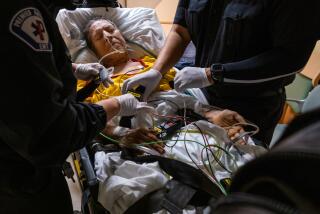From hospital to home, safely
- Share via
Modern American medicine does many things exceedingly well, but helping patients leave the hospital is not one of them. Many are sent home still groggy from drugs and in need of assistance they might not have.
“In the hospital, the bathroom is close by, there are no stairs, food is brought to you, medicines are brought to you, your health status is checked on a regular basis,” said Andrew Dreyfus, executive vice president of Blue Cross Blue Shield of Massachusetts. “Suddenly, when you go home, that structure is removed.”
Sharon Postma, 48, a Boston resident who teaches fifth grade in Wayland, Mass., became an unwitting expert on this topic last summer. Postma had an emergency hospitalization for a kink in a ureter, a tube that carries urine from the kidneys to the bladder. When she was discharged, a friend dropped her off at home, still woozy on pain medications.
“I should have had someone stay overnight, but I didn’t,” said Postma, who lives alone and spent her first night home drugged and feverish.
When she had to return for surgery a few months later, Postma arranged for a friend, Mandy Waddell, to stay the night. The experience, for Waddell, was eye-opening. “Hospitals sometimes seem to treat everyone as though they had family to go home to. They try, but they don’t always take enough into account those of us who live alone and may not have help.”
About 28% of Americans now live alone, according to the U.S. Census Bureau, with no one on site to help decipher pill bottles, cook dinner, or even navigate the route from the bed to the bathroom. Discharge planning is such a problem that, in August, the Joint Commission on Accreditation of Healthcare Organizations, the group that accredits hospitals, launched a new campaign to help patients negotiate the hospital-to-home transition. (To see the brochure “Planning Your Recovery,” go to www.jcaho.org and look under “Speak Up.”)
“In any industry, the point where there is a hand-off of information is a risky period,” said Dr. Peter Pronovost, a patient-care expert at Johns Hopkins in Baltimore.
But the hand-offs are especially difficult in healthcare “because of the way we pay for healthcare -- it’s highly fragmented,” said Dr. Don Berwick, chief executive of the Institute for Healthcare Improvement, a nonprofit advocacy group. “Transitions don’t go well because patients are moving from one ‘silo’ to another,” from the hospital’s care and billing system, back to their own doctor, home health aids or others who are billed separately. It takes time, energy -- and often a team of social workers -- to set up and arrange payment for services at home.
Given that it could be years, if not decades, before somebody figures out a better system, here is a simple guide for the newly discharged:
* Most important: Be proactive, early and often.
If you are likely to be discharged to a rehabilitation facility or a nursing home, check out -- or have a friend or family member check out -- two or three places before your hospitalization. You often have a choice.
If you expect to go home soon after an operation, “the time to start talking about what you will need afterward is in the surgeon’s office when you’re talking about the surgery,” said Dr. Michael Gustafson, vice president for clinical excellence at Brigham and Women’s Hospital -- not when you’re lying in the hospital bed feeling terrible. With orthopedic procedures, for instance, some hospitals, including the Brigham, will send a nurse or physical therapist to your home before the surgery to check things like whether you’ll need to move furniture or how many stairs you’ll have to climb.
If it’s an emergency procedure, obviously, it’ll be harder to plan, but now’s the time to call in favors from friends.
* Give some thought to the awkward business of getting medications for a homeward-bound patient. Do you leave your pale, exhausted spouse or friend in the car while you run in to the drugstore? Or do you take them home and leave them alone while you dash out again?
Some hospitals, including the UCLA Medical Center, now have on-site outpatient pharmacies to minimize this hassle, said Dr. Tom Rosenthal, chief medical officer at UCLA Medical Center.
One solution is to ask the hospital to fax your prescriptions to your local pharmacy so that the medications will be ready for quick pickup on your way home.
* Read the discharge instructions. Hospitals do seem to be getting better at providing discharge instructions -- in fact, they have to by law, said Leslie Kirle, senior director for clinical policy and patient advocacy at the Massachusetts Hospital Assn. You, a friend or family member need to “read it before you leave, and ask a doctor or nurse to go over it with you to make sure you understand it,” said Stephen O’Neill, social work manager for psychiatry and primary care at Beth Israel Deaconess Medical Center.
* Never leave the hospital without having, in writing, the phone numbers of doctors or nurses you can call 24/7.
* And get, in writing, a list of your new medications and ask if these conflict with drugs you already take.
* Finally, don’t leave the hospital if you really feel you are not ready. You can insist on speaking, right from your hospital bed, to a hospital patient advocate, or call your insurer and beg to stay an extra day or two.
On the other hand, if you do leave, you can console yourself with the knowledge that you may be safer and happier at home, where there are fewer nasty germs -- and fewer people to interrupt your sleep.
More to Read
Sign up for Essential California
The most important California stories and recommendations in your inbox every morning.
You may occasionally receive promotional content from the Los Angeles Times.













